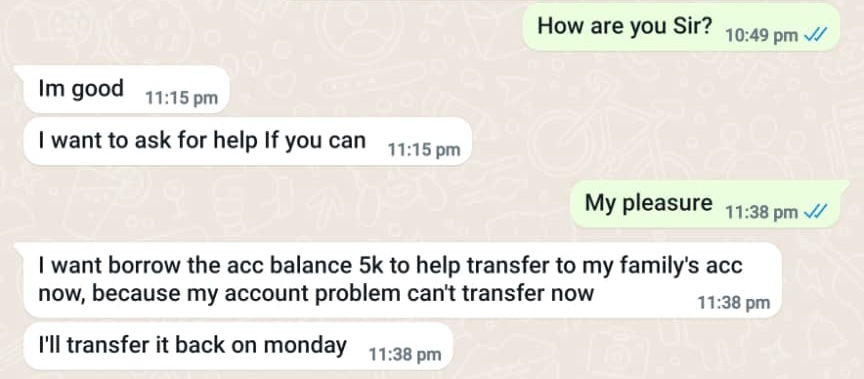CYBERSECURITY Malaysia (CSM) has issued a warning to Malaysians about scammers who impersonate and deceive victims into transferring money.
In a Facebook post yesterday (Dec 6), CSM noted that there were fraudulent activities using the application where the perpetrator would pose as someone known to the victim before sending a link and asking the victim to click on it.
Clicking on this link would lead to the victim losing access to their WhatsApp account.
“The scammer will then take over the hacked WhatsApp account and use the victim’s identity to commit fraud. They will impersonate the victim by sending messages to the victim’s contacts via the WhatsApp account,” CSM said in the statement.
“Common scam techniques include texts saying a loved one is in imminent danger or needs cash urgently to help them out of a crisis.”
In this situation, the victim’s contacts would be misled into believing their friend sent the message and end up losing money.
“We advise people not to click on any link received via WhatsApp. Do not make any money transfer until you have confirmed and verified with your contacts,” CSM continued.

In response to this matter, the Malaysia Computer Emergency Response Team (MyCERT) had also offered several tips to avoid from becoming a victim.
“Any unusual messages from your friends or family members should be treated as precautions. Second-guess any supposed family members or acquaintances reaching out from new numbers,” it said in an advisory on its website.
“If the person claims they are someone you know, consider whether their writing matches their usual communication style. You can also ask the scammer a question such as only your relative or friend would know the answer.”
MyCERT further advised users to avoid clicking on external links, suggesting that users search for the company or agency’s official contact information online if they were unsure if the link is from a legitimate site.
“Contact the supposed person or entity directly to assess the situation,” it added.
Meanwhile, MyCERT also called for WhatsApp users to set up a two-factor authentication which prevents someone from accessing their WhatsApp account if they were to try to open it from another mobile device.
“They should also report and block any conversations with users that are suspicious and asking to transfer money. It’s better to act swiftly and cut communication once you have identified a potential scam,” it said. – Dec 7, 2023
Main pic credit: LinkedIn









